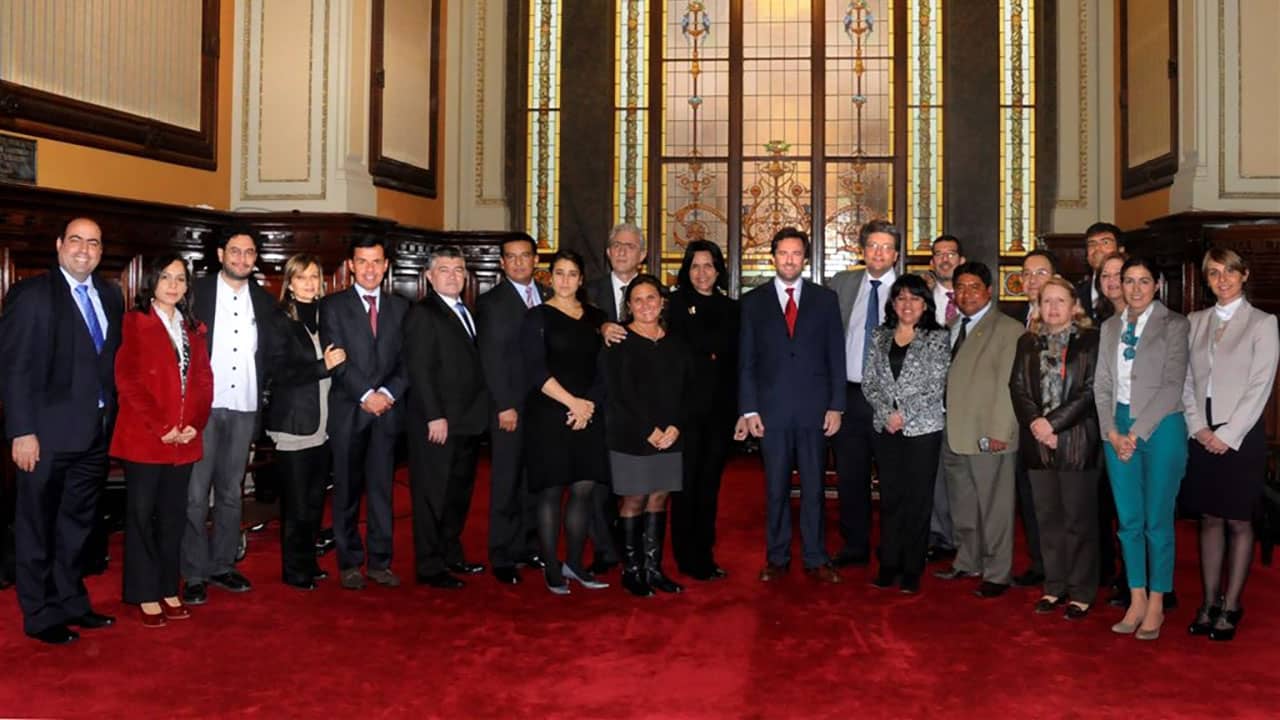
PGA Parliamentary Seminar and Technical Round-Table
September 16 - 17, 2013 | Montevideo, Uruguay
On September 16 and 17, 2013, Parliamentarians for Global Action (PGA) organized a Parliamentary Seminar and a technical Round-Table in the framework of a Sub-Regional Working Group on Challenges for the Effectiveness of the Rome Statute system in the Americas, which was hosted by the Chamber of Representatives of Uruguay in Montevideo.
These events aimed to provide a platform for discussion and action concerning the role of Parliamentarians, Government and society as a whole to create the necessary conditions for effective national investigations and prosecutions of international crimes, notably through the adoption of a comprehensive and effective implementing legislation of the Rome Statute, encompassing crimes, general principles of law and procedures for effective cooperation with the ICC as well as the ratification and implementation of the Kampala Review Conference amendments to the Rome Statute concerning the use of certain prohibited weapons as war crimes in non-international armed conflicts and the definition and jurisdictional regime for the crime of aggression.
The discussions brought together over 20 Parliamentarians from 10 different Latin American States, such as Argentina, Bolivia, Colombia, Costa Rica, Dominican Republic, Ecuador, México, Paraguay, Peru and Uruguay, members of the Government led by Uruguayan Foreign Minister Mr. Luis Almagro, other relevant stakeholders and representatives of civil society. In addition, the Seminar benefited from the participation of the Permanent Representative of Liechtenstein to the United Nations, Amb. Christian Wenaweser, who faciliated a result-oriented exchange of views concerning ratification and implementation of the Kampala amendment on the crime of aggression at national level.
The Parliamentary Seminar held on September 16, 2013, was opened by Dip. Felipe Michelini, Convenor of PGA’s International Law and Human Rights Program, who reaffirmed the commitment of PGA to promote peace, democracy and the fight against impunity in the world, and called upon Parliamentarians to fully implement the Rome Statute and take action on the Kampala Amendments as soon as possible.
Parliamentarians as well as members of civil society participated actively during the Seminar and the Round-Table to address different aspects of the effective implementation of the principle of complementarity in their countries, notably through an appropriate political support and the establishment of an effective legal framework for the fight against impunity.
These events provided Parliamentarians with the necessary tools to boost, in their respective states, the implementation process of the Rome Statute and the enactment of laws of cooperation with the International Criminal Court, as well as, a better understanding of the Kampala amendments in order to promote their ratification and implementation at national level.
The parliamentary Seminar was an instance where, in addition to the introductory presentations by experts in the different topics, Parliamentarians explained the stage of the ICC processes in their own country and analyzed of the different issues stalling or hampering the adoption of relevant legislation. This event provided an opportunity for all participants to have a broader view of the level of involvement of several Latin-American states with the ICC and to take in consideration the experiences of other countries to overcome obstacles and challenges that could be present in their countries.
On September 17, 2013, experts from different organizations participated in a technical Round-Table on implementation of the Rome Statute of the International Criminal Court, Dr. David Donat Cattin and Dr. Deborah Ruiz Verduzco from PGA, Mr. Hugo Relva from Amnesty International, Ms. Michelle Reyes from the Coalition for the International Criminal Court as well as Ms. Mariana Chacon Lozano from the International Committee for the Red Cross (ICRC). In this workshop, Parliamentarians were able to ask questions to the experts on specific areas related to the implementation of the Rome Statute such as definition of crimes, modes of criminal responsibility, the Kampala amendments as well as issues relating to effective cooperation with the ICC and ad hoc agreements. It was an useful opportunity for Parliamentarians to realize which steps are necessary to incorporate the Rome Statute into the domestic legal system, taking into account that in all national Parliaments there are several bills that require urgent treatment and adoption by relevant committees and specific strategies must be deviced to advance the ICC Bills within complex national agenda.
The Round-Table was enriched by a presentation delivered by Amb. Christian Wenaweser, who gave a comprehensive overview of the principles and operation of the jurisdiction of the Court over the Crime of aggression and explained to Parliamentarians the ratification and implementation process of the Kampala Amendments in Liechtenstein and the importance of ratification of the crime of aggression amendment before the end of 2015.
The Seminar was closed by the President of the Chamber of Representatives, Dip. Dr. German Cardoso, MP, who insisted on the need to continue with this kind of activities in Latin America to promote the universality of the Rome Statute, the complementatity of the national jurisdiction with the ICC, the cooperation with the Court and the ratification and implementation of the Kampala Amendments, recalling that Uruguay was going to soon become the first Latin American country in ratify the Kampala Amendments.
As a result of these deliberations, MPS present in the Seminar pledged to adopt concrete measures to implement the Rome Statute, enact laws of cooperation with the Court and boost the ratification of the Kampala Amendments in their respective countries, starting with the adoption by the Latin American Parliament (Parlatino, with which PGA has a Memorandum of Understanding) of a new parliamentary resolution to give effect to the “human right to peace” via the operationalization of national and international jurisdictions on the crime of aggression.

